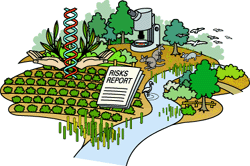Jeremy Rifkin Endorses Biotech?

Jeremy Rifkin, prominent activist and critic of biotechnology, seems to have softened his opposition, according to this story in Science (subscription needed). Rifkin is the author of Who Should Play God? (1977) and The Biotech Century (1999) and was once desribed, in Time Magazine, as the most hated man in science. But now it seems that Rifkin is less hostile to agricultural biotechnology and actually supports marker-assisted selection (MAS). Here is an excerpt from the story in Science:
For years, activist Jeremy Rifkin was the bête noire of biotechnology. Beginning in 1983, he filed several lawsuits to block field trials of genetically modified (GM) organisms and grabbed headlines around the world. Rifkin, an economist who runs the nonprofit Foundation on Economic Trends in Washington, D.C., said such actions were necessary to force an insulated research world to confront pressing ethical questions. To many in the scientific community, however, Rifkin was simply fanning irrational fears about biotechnology. A headline of a 1989 Time magazine profile called him "The Most Hated Man in Science" and captured the prevailing sentiment.
....In a white paper posted to his organization's Web site this week, Rifkin says MAS offers all the advantages of new genomic science without what he calls the great risks to human health and the environment posed by GM crops. Instead of transferring genes from one species to another, MAS simply speeds and improves traditional plant breeding. Researchers search through maps of a plant's genome for sequence markers that are consistently associated with desired traits such as improved yield or disease resistance. Those markers can then be used to screen breeding stock and the progeny of traditional crosses even before they are grown or planted in the field.
Rifkin touts MAS as a path toward cheaper organic food and more sustainable agriculture. And to ensure that all reap its benefits, he advocates that MAS be used in a patent-free, or "open source," system in which the genetic information and techniques used to assist breeding are freely exchanged. "It's not enough to know what you're against. … This paper is my effort to try to frame an opportunity to move into a new age for agriculture," says Rifkin, whose immediate goal is to "open a conversation" with scientists, industry, and policymakers about the future of MAS.
Cheers,
Colin


<< Home